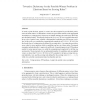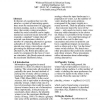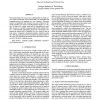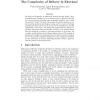15 search results - page 2 / 3 » Determining plurality |
JCSS
2010
13 years 3 months ago
2010
To make a joint decision, agents (or voters) are often required to provide their preferences as linear orders. To determine a winner, the given linear orders can be aggregated acc...
NN
2006
Springer
13 years 5 months ago
2006
Springer
In theories of cognition that view the mind as a system of interacting agents, there must be mechanisms for aggregate decision-making, such as voting. Here we show that certain vo...
ICIP
2006
IEEE
14 years 7 months ago
2006
IEEE
Three-dimensional (3D) visual scenes with pluralities of graphic objects require considerable network bandwidth to be transmitted and computing power to be rendered on a user'...
OTM
2007
Springer
13 years 11 months ago
2007
Springer
Abstract. We study large-scale distributed cooperative systems that use optimistic replication. We represent a system as a graph of actions (operations) connected by edges that rei...
AAAI
2006
13 years 6 months ago
2006
We study the complexity of influencing elections through bribery: How computationally complex is it for an external actor to determine whether by a certain amount of bribing voter...




